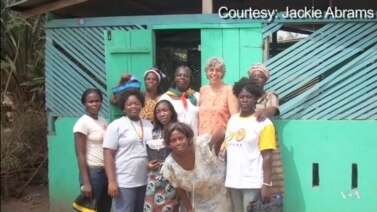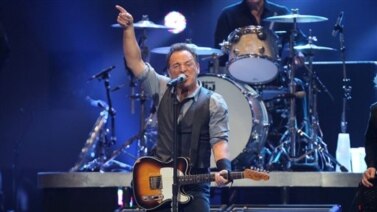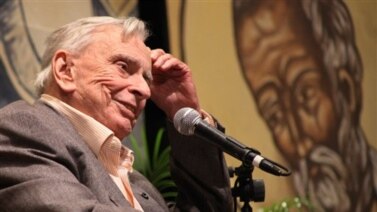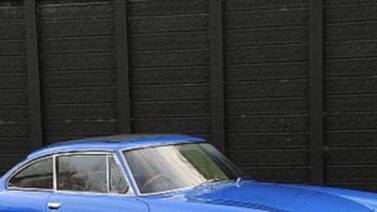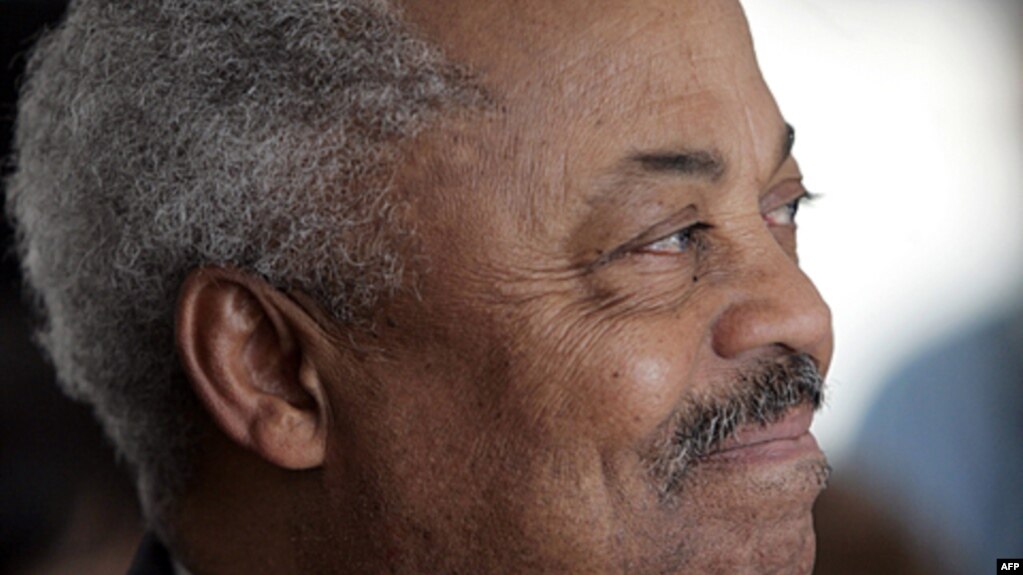
JUNE SIMMS: Welcome to AMERICAN MOSAIC in VOA Special English.
(MUSIC)
I’m June Simms. On the program today, new music from “the Boss,” Bruce Springsteen…
And we go to Texas for a major livestock show and rodeo…
But first, we remember longtime New Jersey Congressman Donald Payne, who died this week from cancer.
(MUSIC)
Donald Payne
JUNE SIMMS: United States Congressman Donald Payne died of cancer this week at the age of seventy-seven. He is well known for his social and political activism, especially concerning Africa.
Donald Payne was the first African-American congressman to represent the state of New Jersey, and a former leader of the Congressional Black Caucus. In addition, he was the first African-American president of the Young Men’s Christian Association, the Y.M.C.A.
Before becoming involved in politics, Mr. Payne served as a public school teacher in New Jersey. He later used his position on the House of Representatives Education and the Workforce Committee to increase financing for education and healthcare.
He was a top member and former chairman of the Foreign Affairs Subcommittee on Africa, Global Health, and Human Rights. In that group, he urged to improve human rights in Africa and increase humanitarian assistance to the continent. He visited several African nations often, including Sudan.
In two thousand two, he was a major force in writing the Sudan Peace Act. The Act provided efforts for food aid to the nation as well as work on settling the conflict. In two thousand four, he urged members of Congress and the American government to declare the killings in the Darfur region of Sudan as genocide.
President Obama praised the work of Congressman Payne. Mr. Obama said Donald Payne made great moves toward human rights protection and democracy throughout Africa.
The United States Agency for International Development is honoring Mister Payne. The agency is creating a new financial program designed to persuade young people to work in international development. The fellowship will urge members of minority groups to consider working in development organizations. The U.S.A.I.D. Donald Payne Development Fellowship will provide support for graduate school, professional development and entry into USAID’s Foreign Service.
(MUSIC)
Houston Livestock Show and Rodeo
JUNE SIMMS: Every year the city of Houston, Texas, reconnects with its rural roots and cowboy past. This week, the Houston Livestock Show and Rodeo is taking place in the city. Mario Ritter takes us there.
MARIO RITTER: The Houston Livestock Show and Rodeo starts with a big parade. Horses take the place of cars on the streets of America’s fourth largest city. One woman expressed surprise.
WOMAN VISITOR: “So, we’ve never seen so many cowboys and cows and horses all together with all the trail wagons.”
The parade of animals, cowboys and cowgirls has opened the Houston event every year since nineteen thirty-eight. But the city has grown a lot since its first Livestock Show and Rodeo. Today, very few American children grow up in rural areas with horses and cows.
But children still love horses, as noted by one young parade watcher.
GIRL: “Cause I’m gonna ride them when I get bigger.”
Every year, groups of people gather in different parts of Texas and ride horses and covered wagons into Houston. They set up camp at Memorial Park in the city. The visitors sometimes come from hundreds of kilometers away.
Houstonian Santo Cruz says the trip by horse helps him reconnect with history.
SANTO CRUZ: “I wanted to have a feeling of how our ancestors had to cross this prairie, at one time or another, you know. There was no cars.”
The event brings horse riders together. Gerald Barkley of Crockett, Texas, and his friend Donald Kimble of Terrell, Texas, meet at the Livestock Show and Rodeo every year with friends they have made on the trail rides.
DONALD KIMBLE: “We all get together and enjoy each other and which some of us haven’t seen each other in a year, so that brings out all the good to me.”
But they also say the rides honor an important Texas tradition.
GERALD BARKLEY: “They promote this way of life so it doesn’t fade away from existence.”
Tens of thousands people attend the Houston Livestock Show and Rodeo. The main event is the rodeo. Cowboys get on powerful horses that try to throw off their riders. Cowboys also ride on bulls or male cows. Cowgirls compete in barrel races. They ride their horses as fast as possible while making very sharp turns around markers placed in the race field.
This year, a new event fills visitors with the spirit of the Wild West of America’s imagination. It is called Cowboy Mounted Shooting. The riders race around, firing guns at balloons. However, no bullets are flying. The guns produce a little fire and smoke. It is burning ash that bursts the balloon.
Cowboy Mounted Shooting requires horsemanship more than strength. This appeals to women riders like Annie Bianco.
ANNIE BIANCO: “It’s definitely an equestrian sport. And so, eighty percent is riding. You have to be a really good rider to do this sport. And then the rest is gun handling.”
In truth, shooting while on horseback was not common in the Old West. But Hollywood westerns have led Americans to connect the two. Competitor Denny Chapman admits the activity seems to capture a moment in time.
DENNY CHAPMAN: “Its loud, it’s smoky. It’s wild. It’s wild west.”
The Houston Livestock Show and Rodeo lasts three weeks. It ends on March eighteenth.
(MUSIC)
Bruce Springsteen “Wrecking Ball”
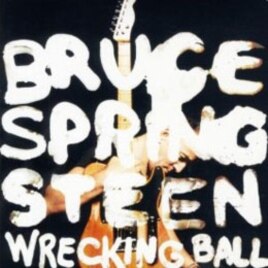
JUNE SIMMS: Rocker Bruce Springsteen released his seventeenth studio album this week. “Wrecking Ball” is his first record since two thousand nine. It is a very direct and angry message about the current state of America. But it is also a cry for an end to economic injustice.
Barbara Klein has more on “The Boss” and his latest work.
BARBARA KLEIN: Bruce Springsteen spoke last month about “Wrecking Ball.” He said the album was inspired by the American financial crisis in two thousand eight. In his words, a “basic theft had occurred that struck at the heart of what the entire American idea was about.” He said people were losing their homes and life savings, and no one was being held responsible.
Bruce Springsteen’s anger about that led to the album’s first single, “We Take Care of Our Own.”
(MUSIC)
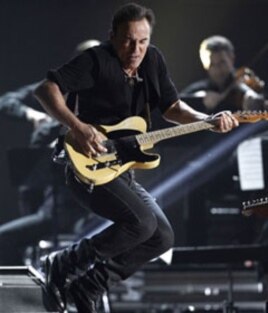
Members of the E Street Band play on the album. The group’s saxophone player, Clarence Clemons, died last year. Bruce Springsteen had played with “the big man” since the singer was twenty-two. Springsteen said losing his friend and band mate was like “losing the rain, or the air.” He called their relationship elemental.
Clarence Clemons appears on “Wrecking Ball,” playing sax on “Land of Hope and Dreams.”
(MUSIC)
Bruce Springsteen and the E Street Band will not go on without a sax player. In fact, two men will take on Clarence Clemons’ part during the concert series for “Wrecking Ball.” And one of them is a close link: Clemons’ nephew Jake. The first concert, in Atlanta, will be on March eighteenth.
We leave you with Bruce Springsteen and gospel singer Michelle Moore performing “Rocky Ground” from the new album “Wrecking Ball.”
(MUSIC)
JUNE SIMMS: I’m June Simms. This program was written by Kim Varzi and Caty Weaver, who was also our producer. Additional reporting came from Greg Flakus.
Hundreds of you have sent in your problems and your advice for readers of our relationship blog. Thanks so much for helping others while you improve your written English.
Keep the problems coming, please! Write to mosaic@voanews.com. Make sure to add the word “relationship” on the subject line.
Join us again next week for music and more on American Mosaic in VOA Special English.
(MUSIC)
